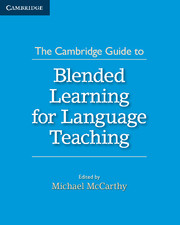Chapter 6 - Teaching as Learning: ‘Des professeurs – pour écouter’
Published online by Cambridge University Press: 22 September 2021
Summary
INTRODUCTION
It is interesting to note that in French ‘apprendre’ (from the Latin ‘apprehendere’, meaning ‘to grasp with the mind, to understand/comprehend’) is the basic word for both ‘teach’ and ‘learn’. If you learn something – say ‘I’m learning Chinese’ – you would say in French ‘J’apprends le chinois’. However, if you’re teaching Chinese to (say) Isabelle, then you would say ‘J’apprends le chinois à Isabelle.’ In other words you (the teacher) are helping Isabelle learn Chinese. And in this action, the learner is understood to be at the centre of your teaching.
In this chapter my premise is that ‘teaching’ and ‘learning’ should be viewed as complementary to one another. In Blended Learning (BL) this premise not only is still valid but is even more important because part of the ‘teaching’ and part of the ‘learning’ do not necessarily happen synchronously. This proposition is based on my extensive experience (some 40 years) in many Higher Education institutions, not just in the UK, but also other countries such as China, Oman, Malaysia, India and recently Georgia, as a teacher, a teacher-trainer, an external examiner and an adviser.
Teaching and learning is a constant dialogue between the teacher (the ‘expert’) and the learner (the ‘searcher’) (Plato, 1955 edition). The teacher is someone who is an expert in their field and whose job is to guide the learner through his or her learning journey ‘sometimes opening the way to him, and sometimes leaving him to open it for himself’ (Montaigne, 1595). Teaching and learning are primarily social interactions and as such the teacher should encourage learners to ‘draw less from books and more from their interactions with the world, with an emphasis on developing the senses, and the ability to draw inferences from them’ (Rousseau, 1762). One could say that this approach is an underlying concept in BL.
This view of ‘teaching’ and ‘learning’ is not new but somehow with the advent of the democratisation of education after the Second World War (1939–1945), this complementarity, this constant dialogue, this guidance, this interaction with the real world seems to have been lost. Emphasis was more on what to teach rather than on how to teach; more on what to learn rather than how to learn.
- Type
- Chapter
- Information
- Publisher: Cambridge University PressPrint publication year: 2015

